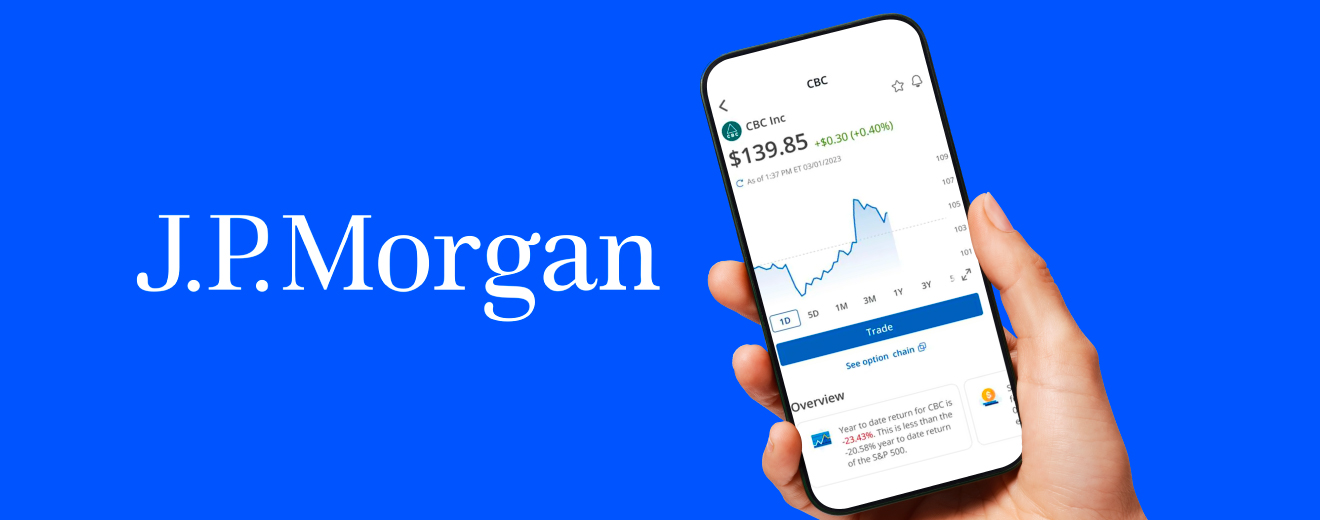Best Financial Advisory Firms: Top 5 Picks for 2025

Our content is for informational purposes only and does not constitute financial, investment, or legal advice. Always consult a qualified professional before making financial decisions.
If you’re looking to invest but need some guidance, an advisory firm may be the right choice. Whether building wealth, managing investments, or preparing for retirement, having expert advice can make a big difference.
Together with a dedicated research team, I reviewed and investigated the top firms, covering fees, features, and pros/cons, to help you make the best decision that properly aligns with your goals.
Here are the latest picks based on real-time data.
What is a financial advisory firm?
A financial advisory firm is a professional institution that helps individuals and companies plan, manage, and grow their assets. A recent study found that 27% of current DIY investors say they are likely to use an advisor in the coming year.
These establishments typically employ licensed financial advisors who provide guidance on a range of topics, including investments, tax strategies, estate planning, and wealth preservation.
Financial advisory firms act as partners, offering strategies that align with your long-term goals, risk tolerance, and lifestyle. Unlike generic financial resources and content online, advisory firms usually provide tailored, regulated advice customized to your unique circumstances and needs.
What do financial advisory firms do?
A financial advisory firm offers a wide range of services designed to help clients manage and protect their wealth. Some core offerings include the following:
- Investment management. Advisors will create, grow, and monitor custom diversified portfolios.
- Retirement and taxes. Help clients prepare for financial security while minimizing tax burdens for life after work.
- Estate planning. These advisors ensure a smooth transfer of wealth to heirs.
- Insurance and risk management. Identify and mitigate financial risks to better protect assets.
- Budgeting and debts. Help clients reduce liabilities, optimize cash flow, and improve overall financial health.
Used in combination, these services can form a holistic approach to your financial safety, ensuring both short-term and long-term objectives are met.
Best 5 financial advisory firms – our detailed list
Below is a list of the best overall choices for today’s top financial advisory firms (in no particular order). To help you narrow the choices, we’ve broken them down by features, fees, and pros/cons, each offering unique strengths for different investor needs.
AdvisorMatch – best for custom advisor pairing

| Minimum investment | Varies by advisor |
| Management fee | Generally, 0.25-1% of assets |
| Account minimum | Varies by advisor |
| Best for | Personalized matching |
AdvisorMatch is a tool that pairs investors with the best financial advisor based on unique needs, location, and financial goals. The fee to get started depends on the advisor you choose (for example, top-market Merril Lynch advisors require a minimum investment of $250,000). Instead of offering a one-size-fits-all solution, the system acts like a matchmaking tool, filtering advisors by specialities, fees, and credentials.
Advisor.com – best for access to vetted RIAs

| Minimum investment | $0 |
| Management fee | $3750/year |
| Account minimum | Varies by advisor |
| Best for | Thoroughly vetted financial advisors |
Headquartered in Charleston, South Carolina, Advisor.com is a registered investment advisor (RIA) and matches site visitors with other third-party RIAs. The solution may be ideal for investors seeking straightforward financial advice, with easy digital onboarding and access to human oversight. Advisor.com thoroughly evaluates credentials, experience, and client reviews through a strict vetting process before recommending any advisors.
SmartAsset – best for educational resources

| Minimum investment | Varies by advisor |
| Management fee | $0 |
| Account minimum | $0 |
| Best for | Investors who want to learn |
SmartAsset is a tool that connects investors with experienced financial advisors. Its primary offerings for consumers are calculators and resources, with no minimum investment or management fees to use the platform (although that may change depending on the advisor you choose).
The company operates as a matching service, referring third-party financial advisors and products; they partner with both local and nationwide firms. SmartAsset also has a strong reputation for educational content, which may appeal to those new to investing.
Fidelity – best for comprehensive services

| Minimum investment | $0-50,000 (depending on service) |
| Management fee | $0 (0.35% for accounts over 25k) |
| Account minimum | $0 |
| Best for | Those seeking a holistic approach |
Fidelity has been in business for over 75 years and is a trusted brand. Potential investors can choose from robo advisory services, full-service wealth management, or customized retirement planning. Its wide array of tools and resources makes it suitable for amateur investors looking to trade. The costs depend on the service you choose, with $0 for robo advisors to thousands for private wealth management.
JP Morgan – best for advanced investors

| Minimum investment | $25,000 or $100,000 |
| Management fee | 0.6% or less (AUM) |
| Account minimum | Varies |
| Best for | Investors with a large minimum investment |
JP Morgan partners with Chase to offer a range of financial advisors who provide personalized financial strategies and investment portfolios tailored to your unique goals. The platform provides robust research tools and 1:1 advisory with a professional who will build an actionable plan for your retirement vision. Users praise this platform since it’s tied to a full-service bank and offers plans for a Personal Advisor and a Private Client Advisor.
Whether you’re a beginner or managing significant assets, our detailed list highlights five of the best financial advisory firms worth considering in 2025.
5 financial advisory firms compared
Before diving into reviews, here’s a quick comparison of the top firms we examined:
| Provider | Fees | Services offered | Minimum investment | Promotions | Best for |
| AdvisorMatch | Varies | Advisor matching | Varies | Free match tool | Personalized advisor pairing |
| Advisor.com | $3,750/year | Advisor matching and resources | $0 | None | Highly vetted advisors |
| SmartAsset | Varies | Advisor marketplace and tools | Varies | Free calculators | Educational and advisor discovery |
| Fidelity | Varies | Comprehensive advisory services | $0 to $50,000 | None | Full-service investors |
| JP Morgan | 0.6% or less (based on AUM) | Private client wealth management | $25,000 or $100,000 | Free consultation | High-net-worth individuals |
Reasons to use a financial advisory firm’s services
A financial advisory firm provides clarity and structure to help you manage your money effectively. While many investors attempt to manage their portfolios alone, professional advisors can bring experience, tools, and strategies to help individuals achieve their long-term goals. Here are some of the top reasons to consider using an advisory firm:
- Personalized investment plan. Advisors can design a plan that is tailored to your unique goals, time horizon, and risk profile, rather than relying on a one-size-fits-all approach.
- Diversified portfolios. Professional guidance ensures your assets are spread out across different types of investments. Portfolio diversification reduces risk and your exposure to market volatility.
- Optimized tax strategies. Advisors can look beyond investment to structure your accounts and withdrawals in the most tax-efficient way possible. This helps investors retain more of their earnings and earn higher net returns.
- Retirement prep. A skilled advisor can calculate how much you need to save to determine your withdrawal strategy. They’ll provide a roadmap for long-term financial security with detailed planning.
Financial advisory firms can bring expertise, tools, and accountability to the table, giving investors confidence in your financial decisions.
Advantages and disadvantages of financial advisory firms
There are many benefits and a few setbacks to hiring a financial advisory firm. Understanding both sides will help investors decide whether professional guidance is the right choice for you. Here are a few points to consider:
Advantages
- Time savings. For busy individuals, delegating portfolio management enables them to focus on personal priorities without neglecting long-term goals.
- Professional guidance. Advisors are licensed experts who are trained to navigate complex financial situations, providing informed strategies for investing, tax planning, and retirement.
- Market research and insights. Firms have access to proprietary tools and research that individual investors do not.
- Holistic planning. Advisors coordinate across multiple areas (such as investments, insurance, estate planning, and tax planning) to create an integrated strategy.
Disadvantages
- Expensive fees. Compared to do-it-yourself investing or robo advisors, firms can charge between 0.25% to 1% of assets annually, which can add up over time.
- Transparency. Not all advisory firms are totally transparent about costs. Layered charges and hidden fees can reduce returns. Be sure to carefully review agreements.
- Conflict of interest. Some advisors may earn commissions from recommending specific products.
Factors to consider when choosing the best financial advisory firm for your needs
Choosing the best financial advisory firm is about more than just comparing fees. Each brand has its own unique features and strengths, which may or may not align with your goals. Here are some of the more important factors to weigh before making a decision:
- Fee structure. Firms may charge in a few different ways, including a flat annual fee, a percentage of assets under management (AUM), or commissions on products sold. Understanding this before you make a purchase is crucial, as fees can directly impact long-term returns. Transparent pricing is always a green flag and a positive sign.
- Minimum investments. Some financial advisory firms allow you to start with $0, while others require $25,000 or even $250,000. Make sure the organization’s thresholds closely align with your current portfolio needs.
- Services offered. Look for platforms that offer comprehensive solutions. A firm should cover investment management, retirement planning, estate strategies, tax efficiency, and insurance, rather than focusing solely on one area of finance.
- Tech tools. Look for an advisory firm that offers tech tools with digital dashboards, mobile apps, and real-time account monitoring. Interestingly, 71% of clients believe their wealth management providers are already using AI. These features create more convenience and provide a smoother experience.
- Advisor credentials. Look for advisors with respected certifications, like CFP (Certified Financial Planner) or CFA (Chartered Financial Analyst). Client reviews and industry recognition are also great ways to validate credibility.
- Communication. An advisor should maintain open lines of communication and ensure you stay updated and confident in your plan. Firms that tailor strategies to your lifestyle and goals will provide the most value.
Robo advisors vs human financial advisors: how they compare
When considering whether to have a human guide your investments or purchase an automated program, it starts with weighing the costs, convenience, and customization options. Here are a few things to consider:
Differences in cost
Robo advisors are generally more affordable and typically charge annual fees of 0.25% or less. Human financial advisor fees usually range between 0.5% to 1% of AUM.
Personalization
Human advisors excel at personalizing strategies to meet an investor’s complex needs, including tasks such as estate planning and tax optimization. Robo advisors often rely on algorithms to create diversified portfolios based on a risk profile, but with limited customization options.
Availability
Robo advisors will operate at all times (24/7) using tools like digital dashboards and mobile apps, making them highly accessible. Human advisors generally require scheduled meetings, which provide the benefit of real-time conversations and trust-building.
Suitability
Robo advisors are best suited for beginners with straightforward goals. Human advisors are the wisest option for high-net-worth individuals or investors with multi-layered financial planning needs.
How did we select the best financial advisory firms
I, along with my research team, evaluated dozens of firms to create a fair and balanced list of top choices in 2025. Our process began with a review of each firm’s range of services, including investment management, retirement planning, estate strategies, and tax support. We closely compared fee structures and transparency when possible.
Customer experience was another priority. We examined client reviews, satisfaction surveys, and the usability of digital platforms, as technology is playing a major role in financial planning. Independent ratings and industry recognition were also factored in to verify credibility. Finally, we weighed general accessibility, including minimum investment requirements and availability of both robo advisors and human support.
By combining these factors, we aimed to highlight firms that deliver value, provide trustworthy advice, and strike a balance between innovation and proven expertise.
Bottom line
Choosing the right financial advisory firm all boils down to your goals, budget, and personal preferences. While all of the firms we reviewed offer strong features, the best fit will depend on where you are in your financial journey. Beginners may prefer solutions with lower minimums and user-friendly tools, while high-net-worth investors typically gravitate toward firms that offer more personalized wealth management services.
Based on our comparison table, AdvisorMatch stood out as the top pick for 2025. Its flexibility, vast network of licensed advisors, and ability to pair clients with professionals that match their unique needs make it a strong choice for investors at all levels. That said, Fidelity also remains an excellent option for those seeking comprehensive services, and JP Morgan continues to shine for advanced investors with significant assets.
Take an innovative and strategic approach. Carefully evaluate your priorities, goals, and needs to find the firm that will leverage your financial future and drive personal success.
FAQ
How much does it cost to hire a financial advisor?
All of your costs will significantly vary depending on the firm and service model. Many charge a percentage of assets under management (AUM), which usually ranges from 0.25% to 1% annually. Some advisors use a flat-fee or hourly structure, which can cost anywhere from a few hundred to several thousand dollars. Always ask for a clear breakdown of prices before making a commitment.
What’s the minimum investment required for most financial advisory firms?
Minimum investments are not always required, but the amount will vary depending on the firm and advisor. Online platforms and robo advisors often start with $0 to $500, whereas traditional firms typically require $25,000 to $250,000. High-net-worth services at large institutions, such as private client divisions, typically require investments exceeding $1 million.
Are financial advisors worth it if I already invest on my own?
They are, especially if you want help with retirement planning, tax strategies, estate planning, or have a complex portfolio. Advisors offer guidance that extends beyond selecting investments, which adds long-term value. If you’re confident in your ability to self-manage, a robo advisor may be a cost-effective alternative.
How do I know if my financial advisor is trustworthy?
Look for an advisor with professional certifications, including CFP (Certified Financial Planner) or CFA (Chartered Financial Analyst). Check the SEC’s Investment Adviser Public Disclosure (IAPD) database and FINRA’s BrokerCheck for past disciplinary actions. Transparent fees, open communication, and positive client reviews are also good indicators of brand trust and credibility.






Your email address will not be published. Required fields are markedmarked